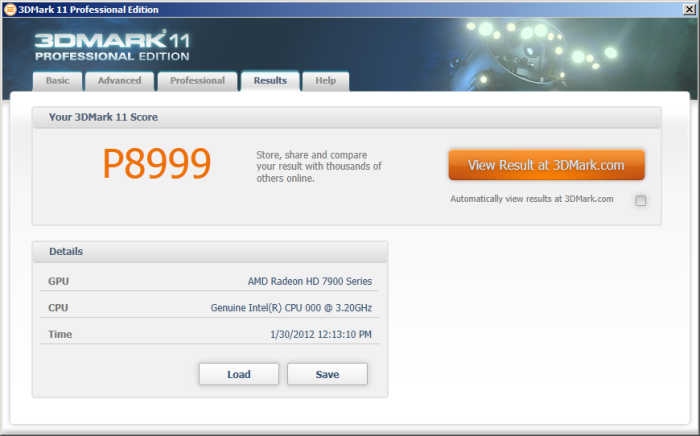Final Words & Conclusion
Final Words & Conclusion
Initially when we went for an overclock in our reference review article we hit roughly 1040 MHz. In this article we noticed that was a little too much without a voltage tweak. So let's say that roughly 1000~1020 MHz is what you can achieve without voltage tweaking. That's still a 20% clock increase and that is huge all by itself.
 Not a bad result -- for two minutes work ..
Not a bad result -- for two minutes work ..
None the less, if you are willing to take some risk, and I do say this carefully as you need to be cautious, then voltage tweaking will be able to set a new milestone all by itself. We achieved 1150 MHz on the graphics core at 1.25 Volts. And that is a great yield in term of overclocking alright.
Much like the R7970 we do not understand that AMD did not clock the product higher at default, a nice 950 MHz or even 1 GHz would have been rather cool for e-peens sake. Perhaps they left some additional reserve for a future product, or tweaking headroom for the AIB/AIC partners, or well they simply felt that a product should have tweaking potential left.
It once again re-establishes the fact that AMD did their homework right on Tahiti, a sound architecture that allows to be clocked at insane speeds, well hats off for that.
Remember, if you like to play it save then by all means forget about voltage tweaking. Just put the card at 950 to 1000 MHz and be savvy with that.
Voltage tweaking comes at a higher risk of damage. Next to that your power consumption will increase quite a bit, your temperatures will jump up which and you'll need to compensate that with better cooling. And I'm not even touching the topic of lifespan as yes, it will have an adverse effect on it as well.
So then, we'll not to make this conclusion any longer then needed, the Radeon HD 7950 is impressive at many fronts however we are very awed by the overclocking potential. Without voltage tweaking, it yields results in more performance while the surrounding conditions like TDP, heat and noise remain absolutely under control. That's free extra performance, at very little extra risk or annoyances. And that's just lovely ....
If you like to go a little more extreme ... well you have a decent guide here with this article. Oh and for those wonder, we did not use the vanilla / cherry picked R7950 reference sample from AMD. We used the HIS R7950, a retail card with the somewhat cheaper PCB. Go figure ;)
- Leave/read comments on this product
- Sign up to receive a notice when we publish a new article
- Or go back to Guru3D's front page
